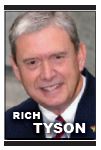By Richard Tyson
Sgt. Herbert G. Tyson had just finished lunch when somebody hollered, “Get out of the mess hall! Here they come!”
Tyson shared what happened next: “Everybody jumped up and started for the door, where our helmets were setting on a table. When I got to the table, I couldn’t find my helmet. Finally, there was only one and I was the only one left indoors, so I grabbed it and ran outside. I crossed over to the garbage pit and dove in. The garbage pit was large enough that the Zeros could fire into it and hit the opposite bank. So, during this time I kept jumping from side to side, depending on which direction the fighters were coming from.”
It was December 1941 on the island of Luzon in the Philippines and World War II had begun. Sgt. Tyson was an Army Air Corps aircraft mechanic when the Japanese Imperial Forces launched their attack, but it wasn’t long before he became a foot soldier, defending the Bataan Peninsula.
What followed for Tyson and his fellow combatants was truly tragic. After months of short rations, fierce combat and disease, Gen. Edward King was forced to surrender approximately 75,000 troops at Bataan in April 1942. That set in motion the infamous Bataan Death March, a forced march of approximately 65 miles from Mariveles, on the southern tip of the Bataan Peninsula, to the town of San Fernando.
Already starving and dealing with horrific tropical heat, the trek took the lives of thousands of men, many of whom were brutally beaten, bayoneted or literally crushed into the roadway by Japanese tanks. Survivors of the march were then crammed into railcars and taken to prisoner-of-war camps. Thousands more died there from mistreatment, malnutrition and disease.
Hunger became the normal condition for POWs. Tyson shared stories of short rations of watery rice, often maggot-infested. He even told of catching and eating rats. He also suffered from a variety of diseases, including dysentery and malaria.
But disease and starvation were the easy parts. The brutality of his captors took the experience to a much deeper, hellish level. In his memoirs, he shared:
“Being beaten was something you understood would happen to you daily. You were either going to get slapped or you were going to get beaten on the head with a sledgehammer handle. Daily, each and every man could assume that sometime during the day he was going to get beat some way or another. It just got to be an accepted fact. Once you went to work and the guards came out and started checking, you’d be lucky if you weren’t picked on. Usually they picked on everybody, there were no exceptions.”
Sgt. Tyson was liberated in Osaka, Japan, in September 1945. Like his fellow survivors, he was a skeletal version of himself and it took many months of rehabilitation to recover. Some lingering effects never left him; he had flare-ups of malaria and there were terrible memories that haunted him.
Fast-forward to 1960. Tyson, then a captain in the U.S. Air Force, was married and a father of two sons — including me. He had just received an assignment that would take our family to Tachikawa Air Base in Japan. As we prepared to depart, Dad sat down with my brother (age 6) and me (age 10), and talked to us about the move. He related a bit about the war, but then emphatically stated that the Japanese people were a great and noble people who deserved our love and respect. He and our mother had always stressed that we should love our fellow man, so this instruction didn’t seem significant to me at the time.
It was only years later, when I had the opportunity to meet some of my father’s fellow survivors, that I realized how incredibly unique his attitude was. Nearly all of these men had a great hatred for the Japanese, which they expressed liberally. And this was, of course, understandable.
My father gave my brother and me an enduring gift by his choice to let go of the horrific treatment he had experienced as a POW. He chose to forgive and he stripped away any potential biases based on “the sins of the fathers” that might have infected his sons’ attitudes toward the Japanese. He literally broke the cycle of hatred.
As I consider the leadership principles I have learned over my career, one of the most significant was taught me by my father: Don’t get hung up on what has happened in the past. Forgive, forget and move forward. I believe this has great merit for each of us in our various leadership capacities.
Richard Tyson is the founder, principal owner and president of CEObuilder, which provides forums for consulting and coaching to executives in small businesses.








